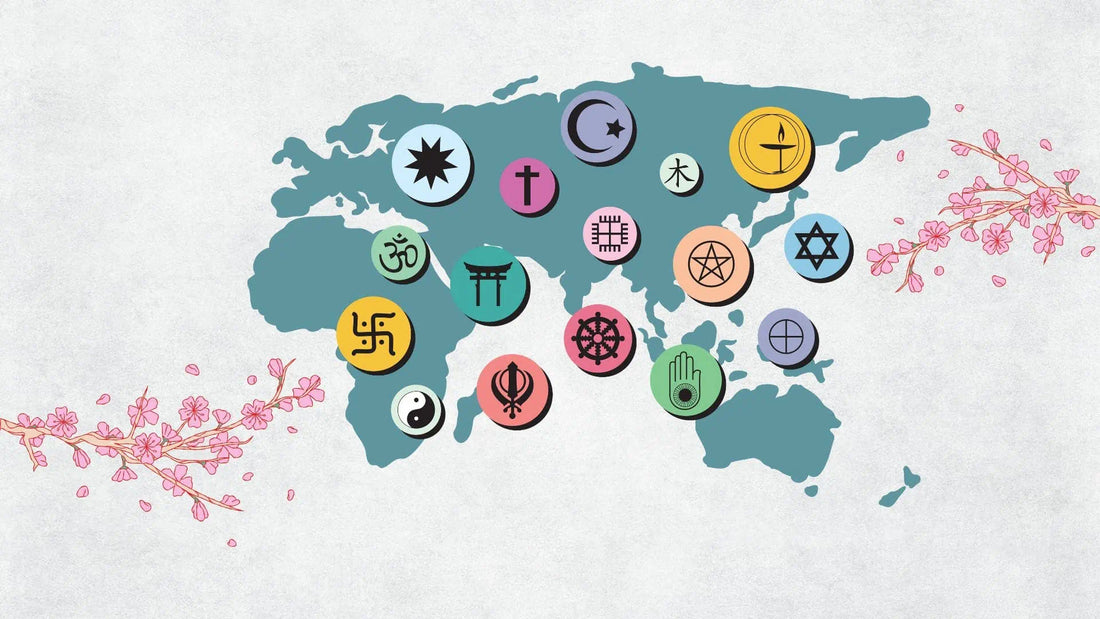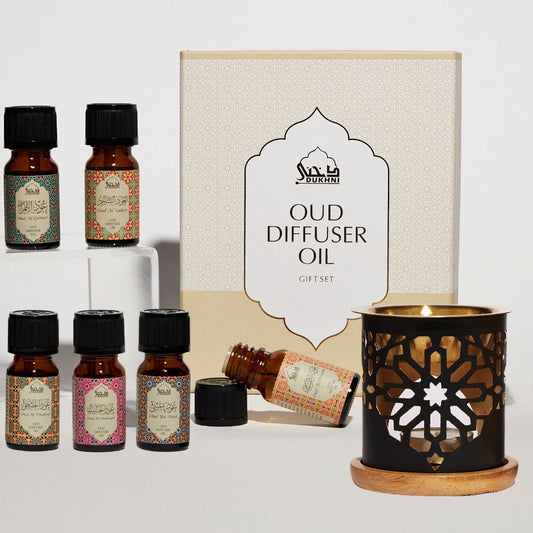Scents of the Divine: How Different Faiths Use Fragrance in Worship and Celebration

Scents have long been integral to religious practices, playing a vital role in rituals, celebrations, and the marking of significant sacred moments. They help enhance the atmosphere, invoke spiritual energy, and deepen the emotional connection between individuals and the divine. Whether it’s the fragrant incense filling a mosque during prayers, the rich aroma of flowers during Hindu festivals, or the warm scent of frankincense in church, the use of scent elevates the experience of devotion. In this blog, we will explore how people belonging to Islam, Christianity, Buddhism and Hinduism use scent to sanctify their rituals and celebrations.
Islam: Scents of Purity, Prayer, and Celebration
In Islamic tradition, the use of scent is closely tied to personal purity, spiritual reflection, and the creation of a sacred atmosphere. Oud and Attar (pure concentrated perfume oils) are prominent in Muslim religious practices and celebrations.
Oud, with its deep, smoky, and rich fragrance, is perhaps the most cherished scent in Islam. The resin of the agarwood tree, which produces Oud, is used for its purifying qualities. It is commonly burned in mosques, homes, and during religious ceremonies to cleanse the space and elevate the worship experience. During the holy month of Ramadan, for example, Oud is often burned as part of the preparations for Iftar, the meal that breaks the fast. The soothing aroma of Oud helps create a calm and contemplative atmosphere, perfect for prayer and reflection after a long day of fasting.
In addition to Oud, Attar - a perfume oil made from distilled flowers, herbs, and spices - plays a role in Islamic practices. Unlike synthetic perfumes, Attar is alcohol-free and is often worn during prayers, festivals, and other significant religious occasions. It’s especially popular during the celebration of Eid al-Fitr and Eid al-Adha, where fragrant oils are applied to the body as a sign of cleanliness and spiritual purity.
The practice of burning incense and using Attar and Oud is not only for worship but also symbolizes hospitality and respect for guests, especially during significant gatherings such as weddings or celebrations.
Christianity: Scents of Reverence, Joy, and Remembrance
In Christianity, the use of scent is deeply symbolic, enhancing both the solemnity of religious observances and the joy of festive celebrations. Fragrances like Frankincense and Myrrh - which are mentioned in the Bible - are still used in Christian liturgies, particularly during major events such as Christmas and Easter.
The biblical significance of Frankincense and Myrrh originates from the story of the Nativity, when the three wise men presented these gifts to the newborn Jesus. Frankincense, a resin often used in incense, symbolizes the divinity of Christ, while Myrrh, also a resin, represents his suffering and mortality. Both of these fragrances and anointing oils are used in Christian worship, especially during Christmas Eve services and Good Friday observances, when their aromatic smoke fills the church, creating a sacred atmosphere and elevating the prayer experience.
Cinnamon, a spice often associated with warmth and comfort, plays an important role in Christmas celebrations. The sweet, inviting aroma of cinnamon is found in baked goods, hot drinks, and candles, filling Christian homes with fragrance during the holiday season. This warm spice is symbolic of the love and joy associated with Christ's birth. Similarly, Cloves and Nutmeg are also widely used to enhance the festive atmosphere of Christmas, as these spices are often present in the holiday's traditional foods and drinks.
Lavender, known for its calming and healing properties, is another important fragrance in Christian practices. Lavender is often used during times of prayer, reflection, and healing, especially during the season of Lent. Its gentle, soothing scent is said to promote peace and help individuals center themselves spiritually.
Buddhism: Scents of Mindfulness, Enlightenment, and Reverence
In Buddhism, scent plays a crucial role in fostering mindfulness and creating an atmosphere conducive to meditation, prayer, and enlightenment. Incense, in particular, is an integral part of Buddhist rituals, symbolizing the purity of thoughts, words, and deeds. The act of lighting incense is often seen as an offering to Buddha, expressing respect and reverence while creating a serene space for spiritual practice.
Sandalwood, a fragrance widely used in Buddhist temples and ceremonies, is believed to calm the mind and aid in meditation. Its grounding and centering qualities help practitioners focus on their spiritual journey and maintain a peaceful state of mind. Other popular fragrances in Buddhist practices include Lotus and Champa. The Lotus, a symbol of spiritual purity and enlightenment, is often associated with Buddha himself. Its delicate and uplifting scent is used in offerings and as a representation of spiritual growth amidst worldly challenges.
Champa, known for its warm, slightly sweet aroma, is burned during meditation sessions and prayer ceremonies to enhance concentration and create a sacred environment. Across Buddhist cultures, the use of scent serves as a sensory bridge between the material world and spiritual aspirations, helping individuals transcend the ordinary and connect with a deeper sense of peace and mindfulness.
Hinduism: Scents of Purification, Devotion, and Celebration
In Hinduism, scent plays a vital role in religious rituals and festivals, with a wide range of fragrances used to purify, elevate, and sanctify the atmosphere. Incense in the form of dhoop or agarbatti (Incense sticks) is burned during prayers, offerings, and festivals, and scents like Sandalwood, Jasmine, Rose, and Patchouli are particularly cherished.
Sandalwood is one of the most sacred scents in Hinduism and is often used in daily rituals and festivals. Its rich, earthy aroma is believed to purify the mind, body, and spirit. During the major festival of Diwali, the Festival of Lights, Sandalwood incense is burned to honor the goddess Lakshmi, seeking blessings for prosperity, wealth, and success. It is also used to create an atmosphere of peace and devotion during temple ceremonies and home worship.
Jasmine is another fragrance of great significance in Hindu rituals. Known for its delicate, sweet aroma, Jasmine is used extensively in offerings to the gods during festivals and in daily worship. During the Holi festival, which celebrates the arrival of spring, the fragrance of Jasmine fills the air, symbolizing renewal, purity, and the blossoming of life. Jasmine flowers are often woven into garlands and used to decorate temples, making the entire space fragrant and sacred.
Rose is another symbol of divine love in Hinduism and is used during major celebrations like Navratri. It is believed that the fragrance of Rose purifies the mind and helps devotees connect with the divine feminine energy.
Patchouli, with its earthy and grounding aroma, is used during spiritual practices related to Lord Shiva. The scent is used in pujas (rituals) and during the preparation of sacred oils and incense. Patchouli incense, in particular, is often burned to mark significant moments in Hindu life, such as weddings or personal milestones.
The Universal Power of Scent in Religion
Across all these religions- Islam, Christianity, and Hinduism, scents play a transformative role in enhancing the spiritual experience and marking the significance of important rituals. From the rich, purifying fragrance of Oud in Islam to the sacred Frankincense and Myrrh of Christianity, and the sweet floral offerings in Hinduism, scents serve as conduits for connecting the earthly and the divine.
Through the use of scent, we can feel the presence of the sacred in our homes, hearts, and communities. Scents are more than just fragrances; they are reminders of the divine, offering us an opportunity to experience faith on a deeper, sensory level.
No comments















0 comments